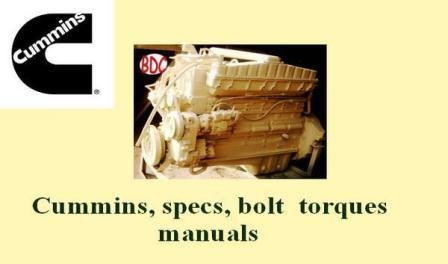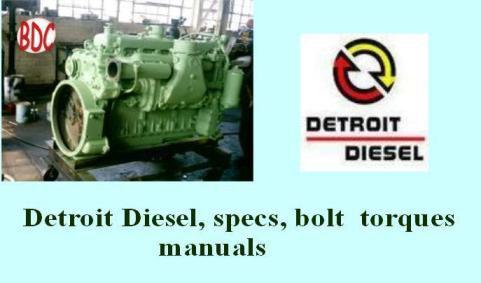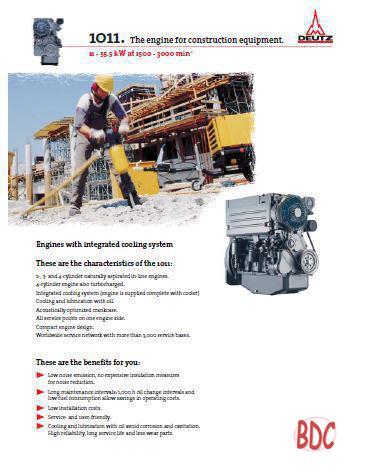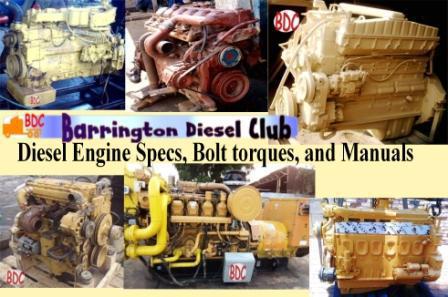Diesel engines consume fuel according to their power requirements.
A correctly tuned diesel engine consumes fuel according to its power requirements. Simple really, the more power you produce the more fuel you use.
The fuel consumption rate for many makes of Diesel Engines can be found in a range between 0.380 & 0.450 lbs/hp hour; 172 & 181 grams/hp hour; 231 & 243 grams/kW hour. This does not represent a big difference in fuel consumption per power unit between most normal naturally aspirated diesel engines, while turbocharged engines are not significantly better.
Fuel consumption for diesel engines is normally more difficult to express than for petrol engines
because of the vast variability in possible applications. Applications like stationary industrial,
marine, automotive, and earthmoving are examples of this variability. So it is normal to express
this fuel consumption as a rate in terms of the weight of fuel consumed per unit of power produced. A real headache
for plant managers!
Now even if an engine operates for long periods at a constant speed it seldom operates at its full rated power.
On a dynamometer, engines seem to operate best at about 70% of expected maximum power, they seem quite tireless when operating there.
Still, asset control may be critical for profitable operation so we trust the following formulae & tables may be of some use.
Turbocharged engines are more efficient.
The aim of turbochargers and aftercoolers are to increase engine efficiency and they do just that. Some of the new turbocharger technologies have resulted in almost unbelievable increases in power output per cylinder of the engine, but this alas, is not a saving in fuel consumption per unit of power produced.
Even so, after some study we have decided to compile two fuel consumption charts, the first one we'll say is for naturally aspirated engines and the second we'll say is for turbocharged engines. However this is an arbitrary classification, and so it's best to get the actual fuel consumption rate for your engine from the manufacturer's spec sheet and then to decide which fuel consumption table should apply to your engine. We'll provide more information on this later, with some example spec sheets to show their theoretical consumption.
You will find some turbocharged engines need to use the table labeled "For naturally aspirated engines" because that's exactly where their fuel consumption falls.
Fuel Consumption units - conversion table
This table converts between the different units of fuel consumption one is most likely to encounter. It may be expanded in time to include other measures for fuel consumpton.
The choice of Specific Gravity of Diesel = 0.853 @ 15.5°C is quite arbitrary and will vary from time to time with different grades of diesel and in different countries; while some engine manufacturers may even specify a different specific gravity for their own tests, presumably for very good reasons. The ASTM for e.g. specify a density between 0.820 to 0.845 for EN590 diesel, while the European standard for the same fuel is between 0.820 and 0.860 kg/m3.
We have used it here because it was a value that Detroit Diesel used for some time, but all it really does here, is to establish a benchmark from where to express ourselves, and from where to work.
| Unit | Multiply by | to get |
|---|---|---|
| lbs / hp hour | 0.533 | liter / hour |
| lbs / hp hour | 0.1408 | US gal / hour |
| US gal / hour | 3.7854 | liter / hour |
| liter / hour | 0.2642 | US gal / hour |
| kg / hour | 1.175 | liters / hour |
| grams / hour | 0.001175 | liters / hour |
| Regard all values as approximate | ||
Examples of Diesel Engine fuel consumption
Fuel Consumption calculations
The above table is based on the following:- Diesel - Specific Gravity = 0.853 @ 15.6°C
- i.e. 1 litre of diesel weighs 0.853 Kgs
- & so 1 Kg of diesel is 1/0.853 = 1.172 liter
- kg = lbs ÷ 2.2
- Kgs/hp hour = lbs/hp hour ÷ 2.2
- & so liter /hp hour = Kgs/hp hour * 0.853
- & liter /hp hour = lbs/hp hour ÷ (2.2 * 0.853)
- & so liter /hp hour = lbs/hp hour ÷ 1.8766
- e.g. 0.40 lbs/hp hour = 0.40 ÷ 1.8766 = 0.2132 liter /hp hour
An engine producing 310 hp at constant speed using 0.350 lbs of diesel per hp hour
uses the following amount of fuel:
310 x 0.350 = 108.5 lbs of diesel per hour
or
310 x 0.350 ÷ 1.8766 = 57.8 liter per hour
An engine at constant speed producing 231 kW at that speed, & using 0.350 lbs of diesel per hp hour
uses the following amount of fuel:
231 x 1.341 x 0.350 ÷ 1.8766 = 57.8 liter per hour
Questions on fuel consumption
Dinesh asks:
I am Dinesh & I have a question related calculation of how much L of diesel required for diesel engine. I have diesel engine with 8 cylinders of piston & 625 HP. I studied your page ...there it was written that 'fuel consumption rate for diesel engines is in range between 0.380 &0.450 lbs/hp hour.' My questions are:.... 1. Is the fuel consumption range of 0.380 & 0.450 lbs/hp hour independent of number of cylinders piston? 2. Why is the fuel consumption rate of diesel engines in the range between 0.380 & 0.450 lbs/hp hour?
Reply:
The number of cylinders does not matter, only the engine power. The 0.380 to 0.450 comes from engine spec sheets, but it can be regarded as 'argumentum ex silentio' that is good until we have more evidence to the contrary. I would love to get more evidence, can you provide any?
 Diesel Engine Specs
Diesel Engine SpecsBasic specs are open to everyone and include images, displacement, dimensions and weight, essential bolt tightening torques, the characteristics of the engine like its power and torque. Essential bolt tightening torques are the main bearing cap bolt torque, the connecting rod cap bolt torque and the cylinder head bolt torques.
 Diesel Engine Manuals
Diesel Engine ManualsYou need club membership for your engine manual or parts book. You subscribe for Membership if you need manuals continually or you can take a one week membership window if you only need manuals for a specific engine.









